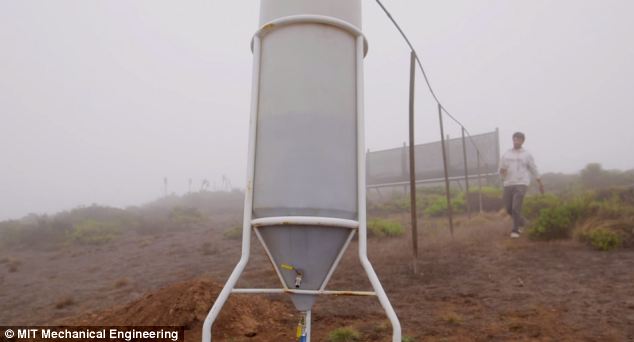
This could change dynamics all over the world. Read more @ The 'magic mesh' that can make water out of thin air | Mail Online
Sorta goes along with another, simply system I found and posted some time ago just can't remember where.
Follow along with the video below to see how to install our site as a web app on your home screen.

Note: This feature currently requires accessing the site using the built-in Safari browser.

A very useful application in very limited circumstances.
It's not going to help most drought-stricken areas of the world.
In a bare clinic room overlooking a stretch of parched red earth, Aisha Mkude is telling us about the loss of her fourth child, a boy, in January. The baby died within a week of the birth after contracting an umbilical cord infection, she says in her native Swahili. Aisha is convinced her baby’s fatal illness was caused by dirty water, dug from beneath a dried-up riverbed by relatives, and transported in jerrycans to the clinic’s delivery room for the birth. It was used to wash the baby, herself, her clothes and the bedsheets. This is Mlali Health Centre, in Tanzania’s Morogoro region – a scenic sprawl of bush and palm trees lying at the foot of the country’s verdant southern Highlands. Chickens wander in, while outside, a woman attempts to sweep away the dust with a broom made of twigs. In the dry season it coats everything – cars, shoes, clothes, hair.

Mothers and children wait at a postnatal clinic held at the Mlali Health Centre, Tanzania
The circumstances in which Aisha gave birth here are unimaginable for most Westerners. Early one morning, she had travelled from her village to the clinic by motorbike taxi, stopping repeatedly on the unmade road because of the pain of labour. Arriving at the tiny delivery room, she was told by midwives that the clinic had no water: she would have to bring in her own supply for the birth. For Aisha, 38, this wasn’t entirely unexpected. The same thing had happened at the births of her other children [three girls, aged eight, 13 and 16], when relatives fetched water from a nearby river. But last January, she recalls, things were even worse: the water situation was “very bad”. Two companions – a sister-in-law and a neighbour – had to dig down into the riverbed to get to water, using shovels and buckets.

Esther Mongi, a midwife at Mlali for 10 years, uses the "Tippy Tap" hand washing system
The birth itself went smoothly but two days later, back home in the village, the baby developed a high fever; on day three, back at the clinic, he was found to be discharging foul smelling water from the umbilical cord. Antibiotics failed to save his young life. Mlali serves a rural population of some 10,000 and houses not only a maternity ward but also antenatal, paediatric and vaccine clinics, a dentist, a laboratory (still under construction) and an adult ward. Yet incredibly, until last June, this simple, one storey building with mosquito screens but no glass at the windows, had no regular supply of water. When the water was piped through, usually once a week, staff stored it in buckets as best they could, but there was never enough.

Clean water comes out of a tap leading from a water storeage unit at the Mlali Health Centre
Women who came here to have their babies, often travelling from distant villages, often in advanced labour, were told to bring in their own supply, usually from nearby rivers or village wells, or other unprotected sources. Each woman would need about 40-60 litres – two to three jerrycans - to wash themselves, their hands, their newborns, their clothing and their bedding. Esther Mongi, a midwife at Mlali for 10 years, says she has often seen women in labour carrying buckets and jerrycans of water, sometimes for miles. In this area, most people are farmers, growing maize and other crops for subsistence or to sell in local markets. “Sometimes a woman goes into labour straight from the fields; she will need to wash but there will be no water in the clinic for a shower or bath.” If they have money, a woman’s relatives might buy water privately, from the trucks which regularly stop here but for many of the rural poor this is unaffordable.
MORE

This could change dynamics all over the world. Read more @ The 'magic mesh' that can make water out of thin air | Mail Online
Sorta goes along with another, simply system I found and posted some time ago just can't remember where.